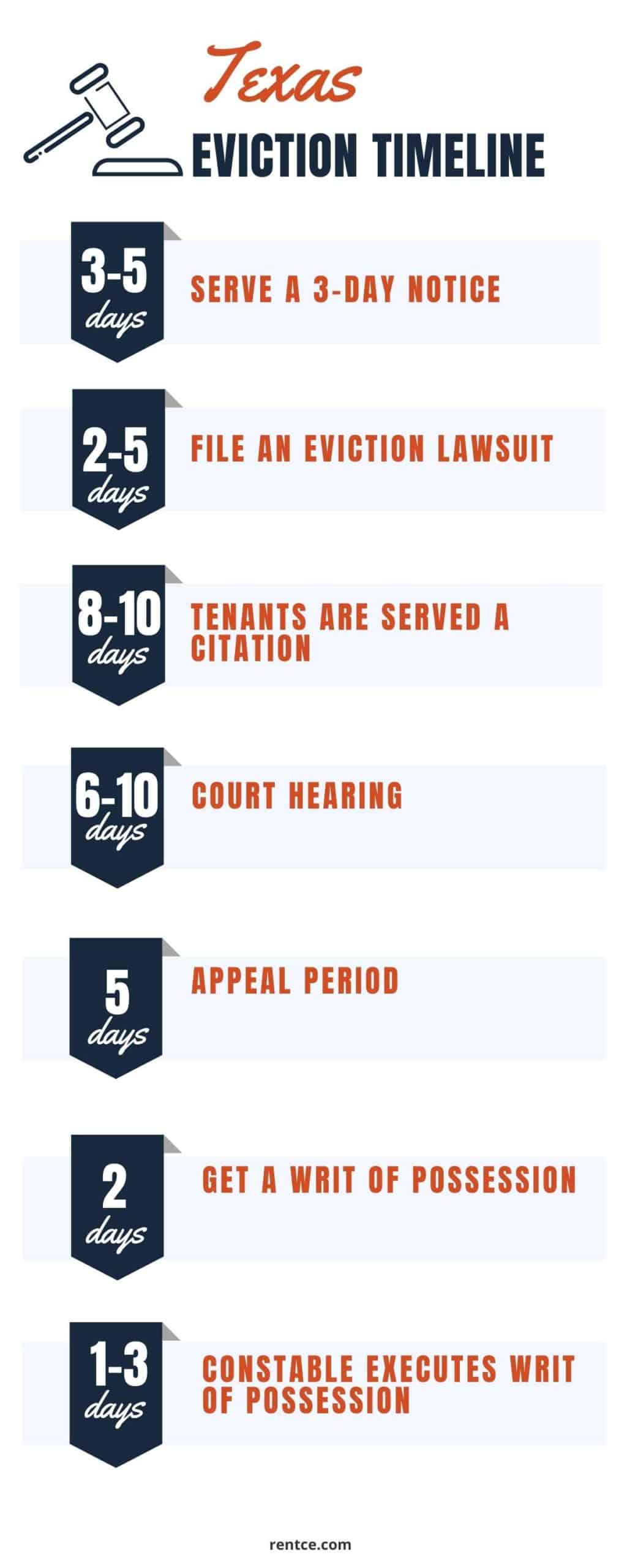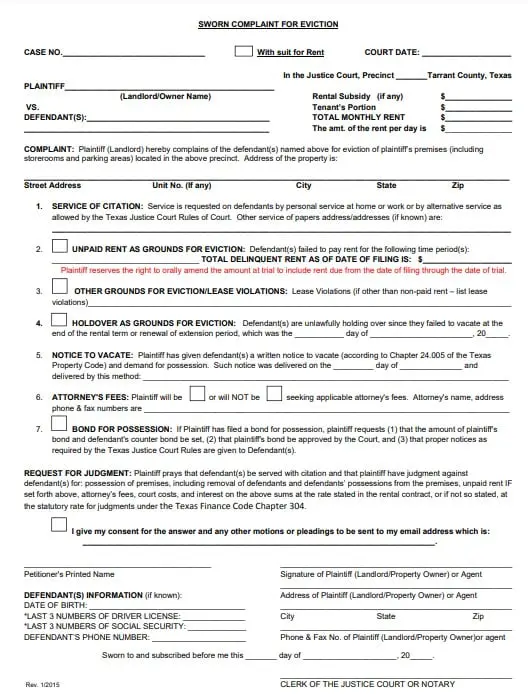
Steps and Timeline of the Eviction Process in Texas
[2021 Updates]
In Texas, the eviction process takes 23-30 days if no appeal is filed. Texas law requires at least a three-day notice to the tenant to vacate before the landlord files a forcible detainer suit. If the tenant fails to pay rent or correct the lease violation, the next step is to file a lawsuit.
These are the steps and the time it takes to evict a tenant.
- Serve a 3-Day Notice to Vacate [3-5 Days]
- File an Eviction Suit [2-5 Days]
- Tenants are Served a Citation (Court Responsibility) [8-10 Days]
- Court Hearing [6-10]
- Appeal Period [5 Days]
- Get a Writ of Possession [2 Days]
- The Constable Executes Writ of Possession. [1-3 Days]
Grounds for Eviction:
- Failure to pay rent
- Violation of lease
- Holding over
- Foreclosure
2021 Update: Important Information about Emergency Rental Assistance Funds.
Check with the Texas Department of Housing and Community Affairs for Emergency Rental Assistance funds from the newly passed Coronavirus Relief Bill and the Texas Coronavirus Relief Bill Rental Assistance Program.
TEXAS EVICTION DIVERSION PROGRAM – Payments of up to 15 months of rent may be available to qualified landlords and tenants.
Information on this program is available here.
U.S. Supreme Court Rules Ends the CDC Eviction Moratorium – September 1, 2021
Texas Justice Court Training Center
Eviction Process in Texas
Step 1: Serve a Notice
Time: 3-5 days
When Should a Landlord Serve a 3-Day Notice?
The landlord or property manager should serve the 3-Day Notice as soon as the tenant stops paying rent unless agreed in a lease to a different period of time or the property was purchased at a tax sale or you are trying to remove the tenant of a person who was foreclosed upon.
How to Calculate the 3-Day Notice?
The 3-Day Notice doesn’t include Weekends and Holidays and the day of delivery.
For example, if you deliver the notice on Friday, you have to give the tenants Monday, Tuesday, and Wednesday to pay the rent.
You can file the lawsuit on Thursday.
How to Deliver the Notice?
The 3-Day Notice can be delivered in three ways:
- In-person and given to anyone residing on the property who is 16 years of age or older.
- Taped on the INSIDE of the main entry door.
- Mail by regular mail registered mail or certified mail with return receipt requested.
Crucial Info When Preparing the Notice
- The notice should be addressed to all occupants (including people who may have moved)
- The date on the notice should be the date you are serving it
The amount due should be an undisputed Rent only amount. Don’t include late fees or any other fees. Consult an attorney if you want to do that.
FREE Fillable 3-Day Notice to Vacate
Step 2: File an Eviction Lawsuit
Time: 2-3 days
Where to File?
Eviction cases must be filed in the Justice of Peace Court where the property is located.
Alternatively you can file it online at: https://selfhelp.efiletexas.gov/SRL/SRL/ExecuteInterview
The application will ask you questions and help you fill out the necessary paperwork. You can also pay online.
The court fees are around $121 it could be more or less in different counties.
This fee covers the filing of the suit, citation delivery to your tenants (not the initial 3-Day Eviction Notice), the hearing.
What Information do You Need to File a Suit?
- Your Contact Information
- The Tenant’s Legal Name and Contact Information
- The Address of the Rental Property
- Rent Amount and Subsidy, if any.
- Military Status of the Defendant(s), including a Defense Manpower Data Center Verification Letter where applicable.
Additional COVID-19 Related Requirements:
CARES Act
Landlords must verify the property is:
- Not a covered dwelling as defined under the CARES Act (not have a federally backed mortgage)
- Not a Low-Income Housing Tax Credit property.
- Not federally subsidized under any HUD, rental assistance, housing grant, or rural housing program.
- Completed Verification of Compliance With Section 4024 of the Cares Act and the CDC Issued Federal Eviction Moratorium
IMPORTANT – If the tenant owes you money other than back rent (like late fees, unpaid utility bills, or property damage), you cannot recover that in an eviction case! Do not put these amounts in your petition.

Here is What Happens After the Eviction Lawsuit is Filed.
Step 3: Tenants are Served a Citation
Time: 8-10 days
Tenants are served a citation, which notifies them that an eviction case is filed against them. This is done either by the Constable.
Step 4: Court Hearing
Time: 6-10 days
A court hearing is scheduled. Either side may request a jury trial. There is a small fee to do that. If the tenants don’t show up for the hearing, the landlord wins by default.
To win a default judgment you need to provide to the court the last known address of the tenants and Affidavit that they are not on active duty in the U.S. military. Verify status here.
Step 5: Appeal Period
Time: 5 days
Any of the parties may file an appeal which is a request for the county court to hear the eviction case again.
To appeal you have to file either an appeal bond from the surety company, a cash deposit in the amount set by the court, or a statement of inability to pay the court costs.
If the tenants are filing an appeal and your eviction suit is for nonpayment of rent, they have to deposit a one month rent in the court.
Step 6: Get a Writ of Possession
Time: 1-3 days
If the tenants have not left the property already, this is an order to have them removed from the property.
There is an additional fee to have a Writ of Possession issued and for the constable to execute the writ.
Step 7: Constable Executes Writ of Possession
Time: 1-2 days
After the Writ of Possession is issued, the constable will post a 24-Hour Notice on the front door. If the tenants are not out the constable will come out and supervise the removal of their belongings.
List of Courthouse Websites and Eviction Information by County:
- Harris County Justice of Peace Court
- Dallas County Justice of Peace Court – look for the Cares Act Funding Site if your tenant is behind on rent because of Covid-19
- Tarrant County Justice of Peace Court
- Bexar County Justice of Peace Court – Rental Assistance for Landlords and Tenants (Asistencia de renta temporal)
- Travis County Justices of Peace
- Collin County Justices of Peace
- Hidalgo County Justices of Peace
- El Paso County Justices of Peace
- Denton County Justices of Peace
- Fort Bend County Justice of the Peace

